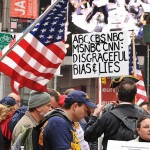Pope Francis gave a rare interview July 29 in which he received and answered a number of questions from the international press corps, with topics ranging from Vatican bank to Curia reform to women in the priesthood to his handling of recent scandals involving Church officials. If you’ve tuned in to the news cycle, though, you’ve probably only heard one thing about this interview: Pope Francis has apparently come out in favor of gay clergy.
Were this actually the case, it might be one of the biggest religious news stories of the year. The trouble is, it’s not true. In fact, a number of responses (such as Fr. Jonathan Morris’s piece, or this one here on Patheos) have placed Francis’s comments within their rhetorical and theological context.
My purpose here is not to rehash those nuances. Instead, I’ll simply point out a troubling fact: The two main groups that have most misrepresented the pontiff’s statements are (1) secular news sources, who are applauding Pope Francis for his “acceptance” of homosexuality and (2) evangelical Protestant news sources, who are citing his alleged acceptance of a gay priesthood as “proof” of the Roman Catholic Church’s waywardness.
The problem here is that neither set of readers is listening to what the pope said; they’re hearing what they want to hear.
For progressives, the desire for a papal thumbs-up for gay rights has caused them to ignore the qualifications in Francis’s suggestion that we not “judge a gay person of good will who seeks the Lord” (again, you can read about these qualifications elsewhere).
Similarly, many Protestants are so eager for ammunition against Rome and its leader that they’ve failed to consider carefully the intent behind Francis’s response. Instead they’ve constructed a straw man to pummel.
In both cases, reporters are jumping the gun; eager to have their ears itched, they miss what’s truly been said.
As Christians, this should trouble us. There is a real conversation to be had about homosexuality and the Catholic priesthood (and the Protestant pastorate, for that matter), with hard questions that need answers. Before that conversation can happen, however, we need to work to perceive and preserve the truth in others’ words — even when those words come from those whom we may deem suspect.











